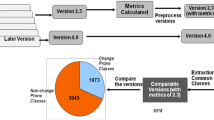Abstract
Within the development of large software systems, there is significant value in being able to predict changes. If we can predict the likely changes that a system will undergo, then we can estimate likely developer effort and allocate resources appropriately. Within object oriented software development, these changes are often identified as refactorings. Very few studies have explored the prediction of refactorings on a wide-scale. Within this paper we aim to do just this, through applying intelligent data analysis techniques to a uniquely large and comprehensive software engineering time series dataset. Our analysis show extremely promising results, allowing us to predict the occurrence of future large changes.
Preview
Unable to display preview. Download preview PDF.
Similar content being viewed by others
References
Advani, D., Hassoun, Y., Counsell, S.: Extracting Refactoring Trends from Open-source Software and a Possible Solution to the ‘Related Refactoring’ Conundrum. In: Proceedings of ACM Symposium on Applied Computing, Dijon, France (April 2006)
BSCKIT Browser Toolkits for Microsoft Visual C++, Microsoft support knowledge base article number Q153393, http://support.microsoft.com/
Cain, J.: Debugging with the DIA SDK, Visual System Journal (April 2004), http://www.vsj.co.uk/dotnet/display.asp?id=320
Chen, G., Banerjee, N., Jaradat, S.A., Tanaka, T.S., Ko, M.S.H., Zhang, M.Q.: Evaluation and Comparison of Clustering Algorithms in Analyzing ES Cell Gene Expression Data. Statistica Sinica 12, 241–262 (2002)
Demeyer, S., Ducasse, S., Nierstrasz, O.: Finding refactorings via change metrics. In: ACM Conference on Object Oriented Programming Systems Languages and Applications (OOPSLA), Minneapolis, USA, pp. 166–177 (2000)
Efron, B., Tibshirani, R.J.: An Introduction to the Bootstrap. Chapman & Hall, London (1993)
Fowler, M.: Refactoring: Improving the Design of Existing Code. Addison-Wesley, Reading (1999)
Mancoridis, S., Mitchell, B.S., Rorres, C., Chen, Y., Gansner, E.R.: Using automatic clustering to produce high-level system organizations of source code. In: Proceedings of the 6th International Workshop on Program Comprehension (IWPC 1998), Ischia, Italy, pp. 45–52. IEEE Computer Society Press, Los Alamitos (1998)
Mens, T., Tourwe, T.: A Survey of Software Refactoring. IEEE Transactions on Software Engineering 30(2), 126–139 (2004)
Mens, T., van Deursen, A.: Refactoring: Emerging Trends and Open Problems (2003), http://www.swen.uwaterloo.ca/~reface03/Papers/TomMens.pdf
Murphy, K.: Dynamic Bayesian Networks: Representation, Inference and Learning. PhD Thesis, UC Berkeley, Computer Science Division (July 2002)
Opdyke, W.: Refactoring Object-Oriented Frameworks. PhD thesis, University of Illinois at Urbana-Champaign (1992)
Pietrek, M.: Under the Hood. MSDN Magazine 17(3) (2002)
Rabiner, L.R.: A tutorial on HMM and selected applications in speech recognition. Proceedings of the IEEE 77(2), 257–286 (1989)
Schreiber, S.: Undocumented Windows 2000 Secrets, A Programmer’s Cookbook. Addison-Wesley, Reading (2001)
Stevens, W., Myers, G., Constantine, L.: Structured design. IBM Systems Journal 13(2), 115–139 (1974)
Zhao, L., Hayes, J.: Predicting Classes in Need of Refactoring: An Application of Static Metrics. In: Proceedings of 2nd International PROMISE Workshop, Philadelphia, US (2006)
Author information
Authors and Affiliations
Editor information
Editors and Affiliations
Rights and permissions
Copyright information
© 2009 Springer-Verlag Berlin Heidelberg
About this paper
Cite this paper
Cain, J., Counsell, S., Swift, S., Tucker, A. (2009). An Application of Intelligent Data Analysis Techniques to a Large Software Engineering Dataset. In: Adams, N.M., Robardet, C., Siebes, A., Boulicaut, JF. (eds) Advances in Intelligent Data Analysis VIII. IDA 2009. Lecture Notes in Computer Science, vol 5772. Springer, Berlin, Heidelberg. https://doi.org/10.1007/978-3-642-03915-7_23
Download citation
DOI: https://doi.org/10.1007/978-3-642-03915-7_23
Publisher Name: Springer, Berlin, Heidelberg
Print ISBN: 978-3-642-03914-0
Online ISBN: 978-3-642-03915-7
eBook Packages: Computer ScienceComputer Science (R0)




